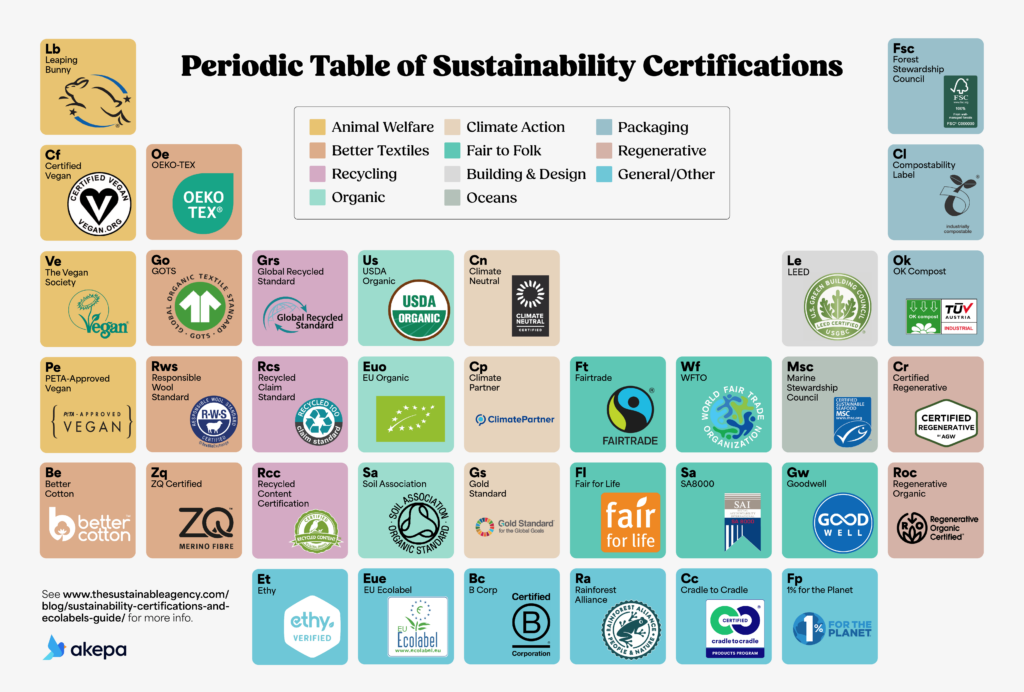
Do you want to learn more about different textile sustainability labels?
In the world of textiles, sustainability labels and certifications have become a vital tool for consumers who want to make more sustainable and socially responsible choices. However, the sheer number of textile labels can feel like navigating a vast “label sea,” with each claiming to address different aspects of sustainability—from organic materials to ethical labour practices and environmental impact. With so many labels out there, it’s challenging to keep track of what they all mean and whether they truly uphold high sustainability standards. Understanding these certifications is key to making informed and impactful decisions.
To help make sense of this, you can explore several resources:
- Keurmerkenwijzer (Dutch) covers a wide variety of product categories, including food, cosmetics, and textiles. It helps consumers navigate sustainability labels, offering clear evaluations on environmental and social impacts across these different sectors.
- Labelinfo.ch (Swiss) provides up-to-date comparisons of textile sustainability labels. The Swiss version of the Keurmerkenwijzer has many labels that overlap with those used in the Netherlands, but is a great resource due to the site’s frequent updates and current information.
- InnProBio – the Forum for Bio-Based Innovation and Public Procurement lists important labels for sustainable feedstock, bio-based content, bio-based products and end-of-life options (compostability, biodegradability)
- Akepa – the Sustainable Agency offers an in-depth guide to sustainability certifications across industries, including textiles, helping consumers understand ecolabels and their credibility.
The 3-CO project promotes sustainable consumption by improving consumer communication about bio-based product labels.


But what about cosmetics?
Just like in the textile industry, the world of cosmetics is filled with sustainability labels and certifications-each promising something different, from organic ingredients and climate-friendly production to vegan formulas and cruelty-free testing. This “label jungle” can make it difficult to distinguish meaningful certifications from marketing claims. Understanding what these labels mean empowers you to choose products that align with your values and support responsible brands. Having a high green price premium, sustainability certification in cosmetics is viewed with special interest.
The following resources will help you navigate the complex landscape of cosmetic sustainability labels, so you can shop with confidence and support a more sustainable beauty industry.
Useful resources for navigating cosmetic sustainability labels:
- Ecolabel Index:
The largest global directory of ecolabels, including a dedicated section for cosmetics and personal care, with concise descriptions and logos for each label.
Ecolabel Index cosmetics and personal care site - Makeup Labs – Sustainable Beauty Labels Guide:
An accessible guide explaining major sustainability certifications in cosmetics, with descriptions and images of key labels such as BDIH, COSMOS, Vegan Society, and more.
How to Spot Sustainable Beauty Products: A Guide to Reading Labels - EU Ecolabel:
The official voluntary label from the European Union, certifying products with a guaranteed, independently verified low environmental impact throughout their life cycle.
EU Ecolabel for Cosmetics - NATRUE:
A leading international standard for natural and organic cosmetics, offering transparent information about its criteria and certified products.
NATRUE Label Information - Ecocert Directory:
A searchable database of companies and products certified to Ecocert’s sustainability standards, including natural and organic cosmetics.
Ecocert Certified Directory
